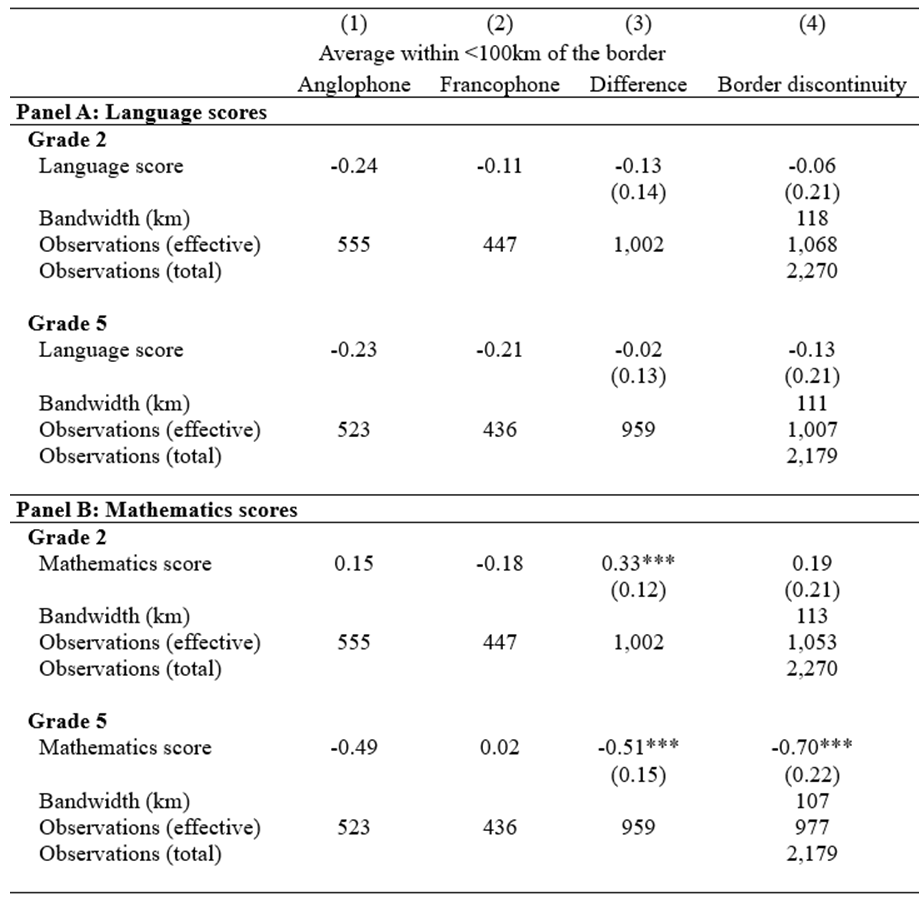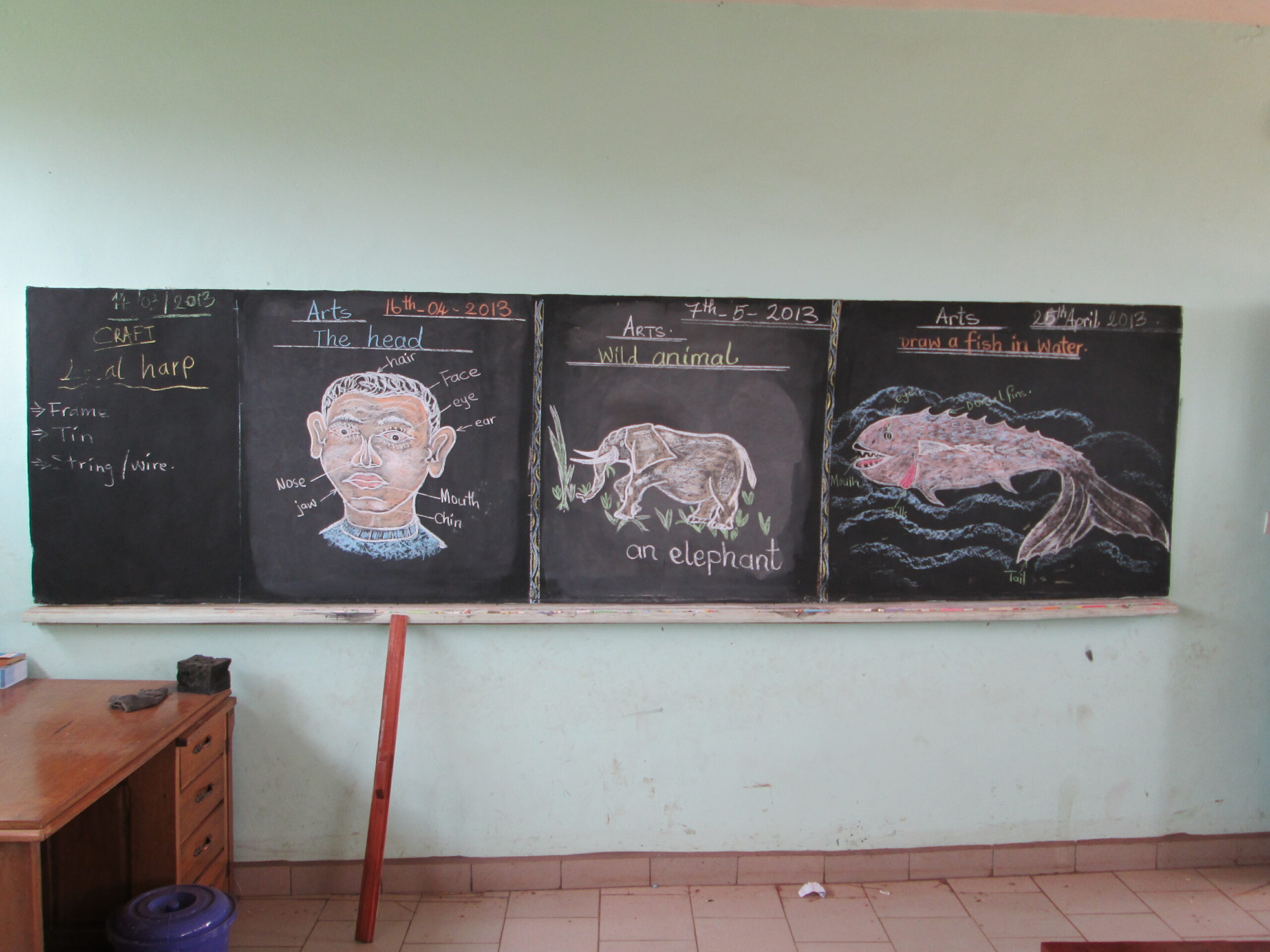Colonial history has left its mark on the education systems of many developing countries. In Africa, the British colonial legacy on education has been more benign than the legacy of other colonisers, especially the French. The British devolved educational investments to Christian missions, while the French limited missionary efforts without investing in mass public education. The resulting divergence between former British and former French colonies in quantitative education measures, like enrolment rates, is well known (Cogneau and Moradi 2014, Dupraz 2019). However, colonial effects on education quality have rarely been investigated. This is important because “schooling is not the same as learning” (World Bank 2018): in developing countries over the last decades, enrolment rates have increased massively, but improvements in student learning have been disappointing. In a newly published paper (Bekkouche and Dupraz 2023), we investigate the effect of colonial origins on students’ test scores using representative school survey data from Cameroon, where a Francophone system coexists with an Anglophone system.
Francophone and Anglophone education systems
According to Woodberry (2004), missionary education “emphasised critical thinking rather than the rote memorisation of classic texts” and “this influenced the teaching style in [postcolonial] systems.” More generally, teaching styles in colonial school systems mirrored the teaching style of the coloniser. The French favoured teaching practices centred around the vertical transmission from the teacher to the students of a predefined curriculum. In contrast, the British favoured more horizontal teaching practices, with less emphasis on the curriculum and more attention to the needs of each student. In one of the rare studies on this topic, Nana (2013) finds that, in Cameroon, teaching practices are more vertical in the Francophone system and more horizontal in the Anglophone system, mirroring the differences between the English and French systems described by Meuret and Duru-Bellat (2003).
A study of Cameroon
The literature on colonial legacies in education has focused on quantity rather than quality because of a lack of comparable data on students’ performance and teachers’ practices. On the African continent, two different organisations produce nationally representative, internationally comparable school surveys: the SACMEQ (Southern and Eastern Africa Consortium for Monitoring Education Quality) in Anglophone countries, the PASEC (Programme d’Analyse des Systèmes Educatifs de la CONFEMEN) for Francophone countries. The standardised test scores produced by these two organisations are not directly comparable, so it is usually not possible to use these surveys to compare education systems with French versus British colonial roots.
Cameroon was divided between France and the United Kingdom after the First World War and reunited after independence in 1961. Today, two school subsystems coexist: a Francophone subsystem with French colonial origins and an Anglophone subsystem with British colonial roots. From 2004 to 2005, the PASEC school survey and standardised test were administered to a representative sample of Francophone and Anglophone schools. This allowed us to compare primary school students’ performance in the two systems. A second benefit of studying Cameroon is that the border separating the Francophone and Anglophone regions was drawn arbitrarily, cutting through regions initially very similar in geography, history, and culture (Dupraz 2019). This allows us to estimate the causal impact of French versus British colonial origins on primary school students’ performance, using border discontinuity analysis – this means comparing test scores of students living very close to the border between Francophone and Anglophone Cameroon (see Figure 1).
Figure 1. Map of schools surveyed by PASEC in 2004-2005

Note: Though there are some Francophone schools in English-speaking Cameroon and some Anglophone schools in French-speaking Cameroon, in the PASEC survey, almost all Francophone (Anglophone) schools are in the French-speaking (English-speaking) part.
Results
Table 1 displays the results of the border discontinuity exercise. The PASEC tested students in Grades 2 and 5 of primary school in language and mathematics. While we find no difference in language scores between the two systems, in mathematics, students in the Francophone system perform better in Grade 5 of primary school (the second to last grade), with test scores higher by two-thirds of a standard deviation. In Grade 2, students’ performance in mathematics is similar in the two subsystems, an indication that students start the primary cycle with similar abilities in mathematics. Grade retention, when low-performing students are held back in a grade instead of moving to the next one, is more common in the French subsystem. In theory, it could explain the better performance of Francophone students in Grade 5 through a selection effect, as the worst-performing students are retained in earlier grades. However, we show that the Francophone advantage is robust to considering this possibility.
Table 1. Results

Note: Scores are z-scores, normalized to have a zero mean and unit variance. The first 2 columns display average scores in Anglophone and Francophone Cameroon within 100 km of the border. The third column displays the difference. The last column presents the border discontinuity estimate (a positive coefficient favours the Anglophone side), estimated using a local linear non-parametric function of distance to the border, with a triangular kernel and MSE optimal bandwidth, controlling for gender and geographic characteristics of the school location. Observations are weighted by their probability sampling weight. Standard errors, clustered by school, are in parentheses. *p<0.1, **p<0.05, ***p<0.01. Effective observations are observations within the bandwidth.
Mechanisms
Why do students schooled in the Francophone system perform better in mathematics at the end of primary school? Is it because of overall socioeconomic differences between Anglophone and Francophone Cameroon? Or is it due to differences between the two school systems, and if so, which ones? We use the rich information on schools, teachers, and students in the PASEC school survey to understand potential mechanisms.
We first show that the Francophone advantage in mathematics is not explained by economic factors outside the school system (the two regions compared seem to have roughly similar levels of economic development). Turning to the quantitative inputs of the education production function, we find that schools in the Francophone system have better class equipment. However, this does not explain the higher mathematics test scores, as the quality of class equipment is not correlated with mathematics test scores.
We finally turn to the question of teaching practices. We use the teacher module of the PASEC survey to build an index of the verticality of teaching practices and estimate whether this index is different in the two subsystems. Confirming the qualitative observations of Nana (2013), we find that Francophone teachers use more vertical teaching practices and cover a larger portion of the official curriculum. However, we do not find that these differences explain a significant fraction of the Francophone advantage in mathematics. This might be because the teaching practices relevant to students’ learning are hard to measure and not captured in the PASEC teacher survey.
References
Cogneau, Denis and Alexander Moradi. 2014. Borders that divide: Education and religion in Ghana and Togo since colonial times. The Journal of Economic History, 74(03): 694–729.
Dupraz, Yannick. 2019. French and British Colonial Legacies in Education: Evidence from the Partition of Cameroon. Journal of Economic History, 79: 628–668.
Meuret, Denis and Marie Duru-Bellat. 2003. English and French modes of regulation of the education system: a comparison. Comparative Education, 39(4): 463–477, 2003.
Nana, Genevoix. ‘This is no French school’: Language and education traditions in primary schooling in Cameroon — a comparative perspective. Research in Comparative and International Education, 8(4): 468–509.
Woodberry, Robert D. 2004. The shadow of empire: Christian missions, colonial policy, and democracy in postcolonial societies. PhD thesis, University of North Carolina at Chapel Hill.
World Bank. 2018. World Development report 2018: Learning to realize education’s promise.
Feature image: A blackboard at the Pledge private primary school in Bamenda, Cameroon, in 2013 (credit: Yannick Dupraz.)
